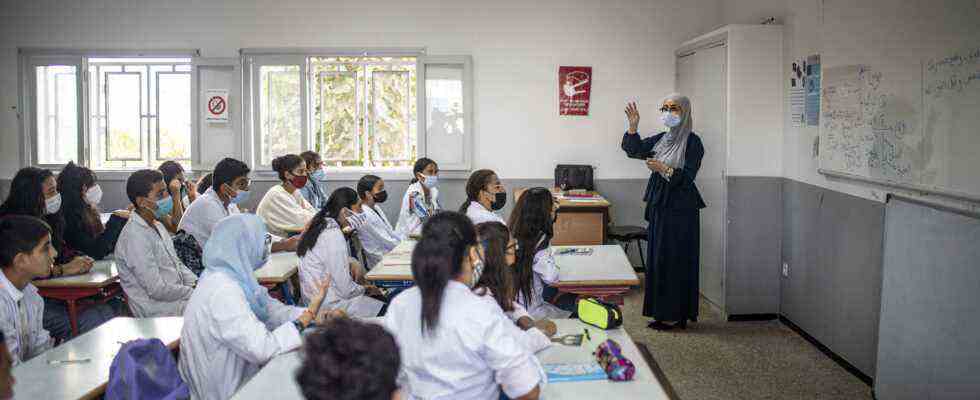Status: 08.01.2022 10:37 a.m.
Almost two thirds of Moroccans have experienced sexual violence. In schools and universities, harassment and coercion often come from lecturers. More and more young women want to defend themselves.
“I’ll take you to a very quiet corner and explain the course to you the way it should be …” or “You pretend you don’t understand – you’re sexy; you turn me on. Send me a sleeping photo from you; I’ll take care of you “: This is what chat messages sound like that professors at Moroccan universities are supposed to have sent to their female students. You are part of the university scandal that is rocking Morocco.
In the autumn and winter of 2021, accusations were raised at universities in Settat, Oujda and Tangier: Professors are said to have sexually harassed and coerced female students there, and demanded sex for good grades. These headlines have shocked the Moroccan public for weeks. Five professors have already come to court. They are accused of “inciting fornication” and “violence against women”. Eleven victims testified against them.
Allegations against professors and lecturers
“The defendants are said to have tried to prevent the victims from filing a lawsuit by using their power,” says lawyer Meriem Jamal Idrissi from Casablanca. That is why only two of the eleven witnesses appear as civil plaintiffs.
It is not the first time that accusations have been raised against university professors or teachers in the Moroccan kingdom. Universities were also accused of inappropriately responding to allegations of sexual assault on their campus.
Most of the time the headlines fizzle out after a few weeks – in at least the cases it goes to court, says activist Karima Nadir. Your initiative “Morrocan Outlaws” has been campaigning against conservative criminal law – for example, sex before marriage – and against violence against women for years.
“Problem of Moroccan Society”
After years of heated debates, Morocco introduced tougher penalties for sexual harassment, abuse and ill-treatment in 2018. In the cases at universities, it is not too slack laws that are the problem – but their application, says Nadir: “It is a problem for the entire Moroccan society, which is sexist. It allows and justifies everything that men do and makes women responsible for everything bad especially for what happens to them. There are laws, but they have to be more accessible to victims, “she urges. “Because such things exist not only because there are perverted professors who allow themselves anything, but because of the feeling of impunity and complicity.”
According to witnesses, the university management also blames women for attacks and silences them, says the activist: “This prevents those affected from denouncing what happened to them and so they suffer throughout their entire student career.”
State surveys show: Almost two thirds of all Moroccan women surveyed have already experienced sexual violence. This is only the tip of the iceberg, say activist groups, because many did not dare to speak about it, let alone report it – for fear of stigmatization in conservative Moroccan society.
“I was 14 when my teacher kissed me”
But this time the public outcry lasts longer – female students took to the streets and demonstrated loudly. To prevent the protest from subsiding, Karima Nadir and fellow activists of the group “Moroccon Outlaws” – “the Moroccan outlaws” – founded the hashtag #metooUniv a short time later and asked those affected to report anonymously about their experiences.
And many do that: “The math teacher touched me. When I asked him what he was doing, he replied arrogantly: You’re used to it and I’m not the last one,” wrote a woman. “I was in sixth grade and I thought if I say something they’ll kick me out of school – so I shut up.”
Another reported: “I was 14 when my teacher kissed me. He was over 50, had children and was married. I was at his home after school because I had questions about the class. Then he took my hand and kissed me. I was totally shocked and traumatized. I hated going to his class. I haven’t been able to tell anyone about it yet. “
Other women report intrusive questions about preferred sexual practices or requests from a teacher to “come to his laboratory” in exchange for good grades.
Anonymous Ministry Hotline for Women
“The reactions have been incredible, so far we are receiving hundreds of stories a day about sexual harassment and violence at universities,” said Nadir of the response from #MeeTooUniv. “That proves to us: It’s enough. It is time to tackle this with full seriousness, so that an end to this violence against women and so that the university becomes a safe place to learn and be productive.”
In fact, something is moving in Morocco, says Nadir: Thanks to smartphones, those affected can at least document harassment today, and more people are made aware of the issue.
The university ministry has meanwhile set up a commission of inquiry: those affected should be able to contact a hotline anonymously.

